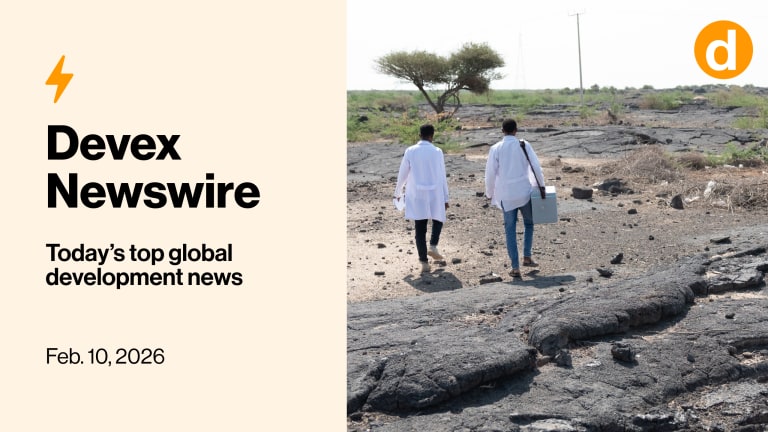Presented by Eleanor Crook Foundation

Forget about “America First.” Are we seeing the next level of “Europe First?”
Also in today’s edition: Are the U.K. aid cuts a done deal? Not to everyone.
Europe first?
The European Union’s mammoth Global Gateway infrastructure and connectivity initiative has never quite sat well with development advocates. They argue it’s too focused on business and self-interest rather than on genuinely helping people in the global south. Think of it as profit over poverty.
Those misgivings haven’t deterred the EU from moving full steam ahead with the ambitious endeavor as it launches a new investment arm aimed at mobilizing private sector finance for sustainable infrastructure and development projects.
European Commission President Ursula von der Leyen, speaking yesterday at the Global Gateway Forum, said this new portal would serve as a “single entry point” for companies to float investments and collaborate with EU member states, development banks, and export credit agencies.
“We have heard from business that you want to be involved early in the process, not just in the implementation, but in shaping priorities and identifying strategic projects,” she said. “We thought about it, we’ve worked on your requests, and we came to a good solution — and this is why we are launching the Global Gateway Investment Hub.”
Civil society sees that “solution,” though, as a problem.
“This hub will serve to implement the problematic approach that underpins the Global Gateway,” María José Romero of Eurodad tells my colleague Jesse Chase-Lubitz. “It uses scarce aid money for objectives that include boosting EU competitiveness, securing investment opportunities for European companies first and foremost, and advancing the EU’s geopolitical goals.”
Read: EU unveils investment hub to boost private sector engagement
ICYMI: How to access the EU’s €300B Global Gateway — key tips from the experts (Pro)
+ Listen: For the latest episode of our podcast series, my colleagues Adva Saldinger and Elissa Miolene sit down with J.P. Morgan’s Faheen Allibhoy to unpack the key issues to watch during next week’s World Bank and IMF annual meetings in Washington, D.C., including how the bank is reshaping itself to mobilize more private capital.
Register now to join us in person or virtually on Oct. 15–16 at the Devex Impact House on the sidelines of the annual meetings, and check out the details of our programming and speakers.
Diagnosing the problem
Last month, Avril Benoît stepped down after six years at the helm of Médecins Sans Frontières in the United States. Six years may not sound like a lot in the grand scheme of things, but it’s been a head-spinningly packed six years.
There was the litany of global crises, from COVID-19 to Gaza. But there were also delicate internal dynamics that Benoît had to navigate, from hiring to funding.
On the latter, most people would say Benoît was a smashing success. During her tenure, donor support to MSF USA shot up from less than $400 million to over $750 million. This represented “unprecedented levels of private funding support and growth,” she tells my colleague Sara Jerving.
“Even within the last year, we’re now — inadvertently — a bigger proportion of the humanitarian aid pie,” she says.
Benoît credits MSF’s funding prowess in part to its straight talk and swift action.
“We’re very straightforward, and try to relay what we see on the ground when it comes to war crimes in places like Gaza or the lack of humanitarian intervention in neglected regions of the world, such as in northwest Nigeria,” she says. “We’re not perfect, and at the same time, we’re tenacious, we’re dogged, we’re willing to take risks and do things and be in places that other organizations are maybe less risk tolerant.”
But the organization has battled conflicts from within as well, including accusations of racism and an outdated colonial mindset. Benoît says MSF took calls for decolonization “to heart.”
Instead of opening many positions in high-income countries, it created hubs of decision-making and coordination in cities such as Nairobi, Abidjan, and Amman.
“It was important for us to not grow our own footprint in the U.S. above and beyond things that actually needed to be here,” she says. “We tried to walk the talk.”
Read: Avril Benoît on her six years at the helm of Médecins Sans Frontières USA
Inquire within
The U.K.’s Labour Party announced back in February that it would slash overseas development spending by 40% to help fund an increase in defense spending. Not everyone is ready to accept those cuts as a done deal, however.
Lawmakers on the International Development Committee in Parliament have launched a major inquiry into the future of the country’s international aid program and how the U.K. can still deliver “high impact” aid as the budget plunges from 0.5% to 0.3% of gross national income by 2027, writes Susannah Birkwood for Devex.
David Mundell, a Conservative member of the committee, tells Susannah the goal is to ensure that cabinet ministers are held to account as they redefine Britain’s role in development.
“The government says it wants to shift from a model of paternalism to one of partnership. We want to understand what that means in practice — and our findings will put the government’s choices under the spotlight, to ensure the U.K. is still standing up to its international obligations,” he says.
Across the development community, the inquiry was welcomed as a rare opening for dialogue — but few expect a U-turn on the cuts, particularly in light of the Conservative Party’s pledge this week to reduce aid even further if elected.
Gideon Rabinowitz of Bond says, “with decisions already underway, we’re cautious about the impact the report will have on where the cuts will fall and on the future direction of U.K. aid.”
Read: UK launches new aid inquiry in response to 40% budget cut
ICYMI: 8 questions we still have about the future of UK aid (Pro)
+ Not yet a Devex Pro member? We have a 15-day free trial for you to explore member benefits including expert analyses and deeper funding insights and opportunities, exclusive briefings with key sector leaders and policymakers, priority access to in-person development events, and more.
Bittersweet honeymoon
Seemingly overnight, Syria has transformed from a war-torn wasteland into a recovering, potentially fully functioning state again — one underpinned by political freedom instead of dictatorial rule.
But that progress could vanish just as quickly, argues businesswoman Alia Natafgi in a Devex opinion piece.
“Since Bashar Assad fled to Moscow last December, Syria has begun to rebuild. An interim constitution is in place. Armed factions are being integrated into state institutions. Dialogue with regional and international partners has resumed. For the first time in years, American diplomats have returned to Damascus,” she writes, noting that on Sunday, “Syrians made more history, heading to the polls in the first parliamentary elections since the transition began.”
“But if the United States does not engage soon — and with clarity — the moment will pass,” she warns.
So what would that engagement entail? Lifting more sanctions and addressing regulatory hurdles that essentially bar American businesses from investing in Syria, among other steps.
“Syria is not asking for sympathy or aid. Syrians are asking for access — to capital, to opportunity, to dignity,” Natafgi writes. “The honeymoon won’t last. If it fades without support, what follows may not be another dictatorship. It may be something harder to reverse — and harder to contain.”
Opinion: A window for US engagement with Syria has opened — but not for long
Related: Change is coming to Syria. Can the aid sector seize the opportunity?
Funding insight: A look into a decade of aid for Syria (Pro)
Pivot with purpose
“The past got you here today, but it need not define you moving forward.”
— Kathryn Harper, development writing expertHarper, who has supported many job seekers in refining their CVs, offered tips during a Devex careers event on transitioning to new job spaces. It’s something legions of laid-off USAID workers are being forced to ponder.
Many of those job seekers are being told to highlight their “transferable skills.” Harper doesn’t like that term.
“‘Transfer’ implies moving from point A to point B in the same vein,” she said. “‘Adaptable’ means you can pivot — you can take what you’ve learned and apply it in new circumstances.”
She also urged job seekers not to shy away from these career pivots, but to clearly and concisely contextualize them.
“The best CVs answer the questions your reader will have before they even ask them,” she said, adding that employers are ultimately looking for problem-solvers, not perfect career trajectories.
Read: Considering a career pivot? 3 CV tips for boosting your application (Career)
+ A Devex Career Account membership gives you access to the article and other benefits including timely reports analyzing development career trends, the full Devex job board with regularly updated opportunities and recruiter insights, exclusive events for insights from top career coaches and sector leaders, and more. Start your 15-day free trial now.
In other news
Nineteen of the World Bank’s 25 executive directors have signed a joint statement affirming their support for the institution’s climate agenda, including maintaining a pledge to allocate 45% of its annual financing to climate-related initiatives. The executive directors for the U.S., Russia, Kuwait, and Saudi Arabia declined to sign. [Reuters]
Prince William will represent King Charles at next month’s COP30 summit in Belém, Brazil, and will host the Earthshot Prize awards in Rio de Janeiro shortly before the conference. [BBC]
The Trump administration mulls providing $50 million for polar bear conservation efforts in Greenland and $25 million for snow leopards in Nepal, even as it makes cuts to other U.S. humanitarian and wildlife programs. [The Boston Globe]
U.K. Prime Minister Keir Starmer has reaffirmed his support for India to have a permanent U.N. Security Council seat during his visit to the Asian country this week. [Financial Times]
Sign up to Newswire for an inside look at the biggest stories in global development.








